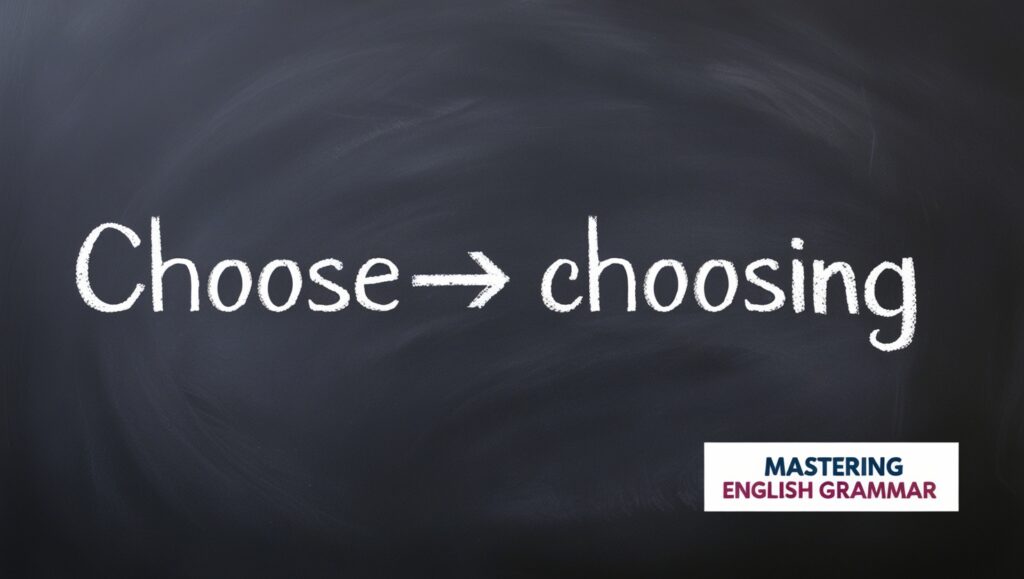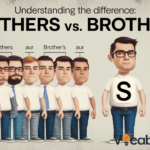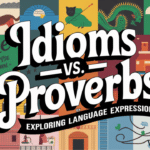In the realm of linguistic practice, few words cause as much confusion as “choosing” and “chosing.”

This article aims to shed light on the correct usage, helping you navigate the intricacies of English grammar with confidence.
The Great Debate Choosing vs Chosing
At first glance, the difference between “choosing” and “chosing” might seem trivial. However, this small variation in spelling can significantly impact your writing’s credibility. The correct spelling is “choosing,” with two O’s. “Chosing” is simply a misspelling that has gained traction due to common usage.
Understanding the Verb Form
To grasp why “choosing” is correct, we need to delve into verb form. “Choose” is the base form of the verb, and when we add “-ing” to create the present participle, we drop the silent ‘e’ and add “ing.” This rule applies to many verbs in English, making “choosing” the grammatically correct form.
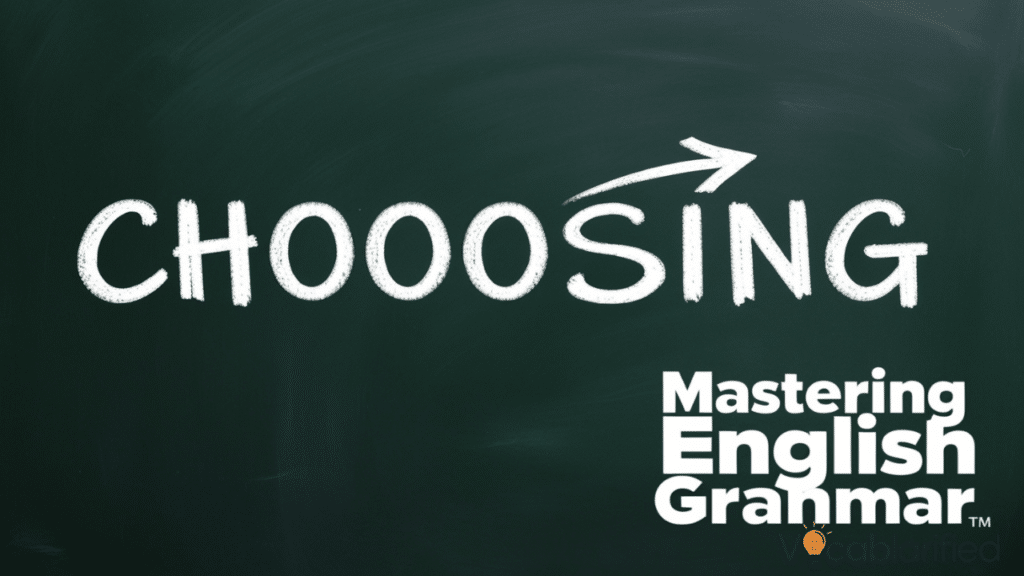
Impact on Communication
Using the correct form, “choosing,” can greatly enhance your professional image. Imagine sending an email to your boss, Sarah Johnson, about an important project decision:
“Dear Sarah, I’m writing to update you on our progress in choosing the new software vendor. We’ve narrowed it down to three options and will be making our final selection next week.”
Now, contrast this with the incorrect version:
“Dear Sarah, I’m writing to update you on our progress in chosing the new software vendor. We’ve narrowed it down to three options and will be making our final selection next week.”
The first example demonstrates a command of language nuances, while the second might raise doubts about your attention to detail.
You Might Also Like: Recieve or Receive: Which One Is Correct?
Exploring Synonyms
To further illustrate the concept, let’s look at some synonyms for “choosing.” These words can help diversify your language and provide alternatives in various contexts.
| Synonym | Example Usage | Formality Level |
|---|---|---|
| Select | We need to select a new team leader. | Neutral |
| Opt | Many students opt for online classes. | Informal |
| Elect | The board elected to postpone the merger. | Formal |
| Pick | Let’s pick a restaurant for dinner. | Informal |
| Decide | It’s time to decide on a vacation destination. | Neutral |
| Determine | The committee will determine the winner. | Formal |
| Designate | Please designate a spokesperson for your group. | Formal |
| Nominate | They nominated him for the leadership position. | Neutral |
| Prefer | I prefer tea over coffee in the morning. | Neutral |
| Settle on | After much debate, we settled on a compromise. | Informal |
The Psychology of Decision-Making
The act of choosing goes beyond mere grammar; it’s a fundamental aspect of human psychology. When we make a decision, we engage in a complex cognitive process that involves weighing options, considering consequences, and applying personal values.
Choice in Everyday Life
From the moment we wake up, we’re faced with a series of choices. What to wear? What to eat for breakfast? Which route to take to work? While these may seem trivial, they all involve the act of choosing.
You Might Also Like: Journeys or Journies? Which one is correct
The Impact of Technology on Selection
In today’s digital age, the process of selection has been revolutionized by technology. Online platforms offer us unprecedented choice in everything from entertainment to shopping. This abundance of options can sometimes lead to decision paralysis, making the act of choosing more challenging than ever.
Cultural Differences in Decision-Making
It’s fascinating to observe how different cultures approach the act of choosing. Some prioritize individual choice, while others emphasize collective decision-making.
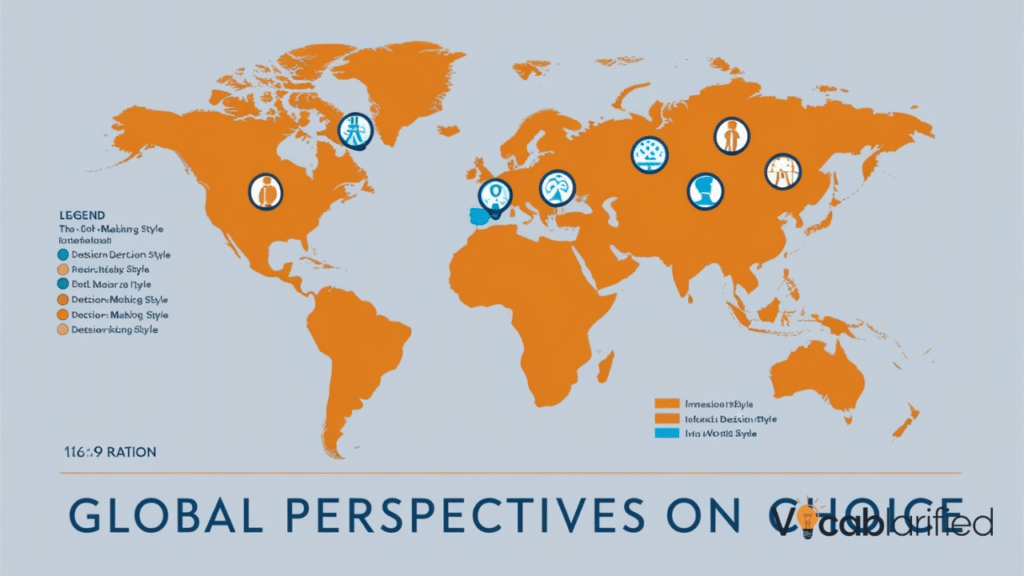
Understanding these cultural nuances can be crucial in international business and diplomacy.
| Culture | Decision-Making Style | Key Characteristics |
|---|---|---|
| American | Individualistic | Values personal choice, quick decisions |
| Japanese | Consensus-based | Group harmony, slower deliberation |
| German | Analytical | Thorough research, logical approach |
| Brazilian | Relationship-oriented | Personal connections influence choices |
| Indian | Hierarchical | Respect for authority in decision-making |
| Swedish | Egalitarian | Inclusive, seeks diverse opinions |
| Chinese | Long-term oriented | Considers historical context and future impact |
| Italian | Intuitive | Relies on gut feeling and personal experience |
| Russian | Centralized | Strong leadership influence on choices |
| Australian | Laid-back | Flexible approach, values work-life balance |
The Role of Intuition in Choosing
While logical analysis plays a crucial role in decision-making, intuition shouldn’t be underestimated. Often, our gut feelings can guide us towards the right choice, especially in complex situations where data alone may not provide a clear answer.
You Might Also Like: Tomorrow Or Tommorrow: Which One Is Correct?
Overcoming Decision Fatigue
In a world of endless options, decision fatigue is becoming increasingly common. This phenomenon occurs when the quality of our decisions deteriorates after a long session of decision-making. Recognizing and managing this fatigue is crucial for maintaining the ability to choose effectively.
The Art of Effective Choosing
Mastering the art of choosing involves more than just knowing the correct spelling. It’s about developing a systematic approach to decision-making that balances analysis with intuition, considers long-term consequences, and aligns with personal values.
You Might Also Like: Training Or Trainning: Which One Is Correct?
Strategies for Better Decision-Making
Developing effective strategies can significantly improve your decision-making process.
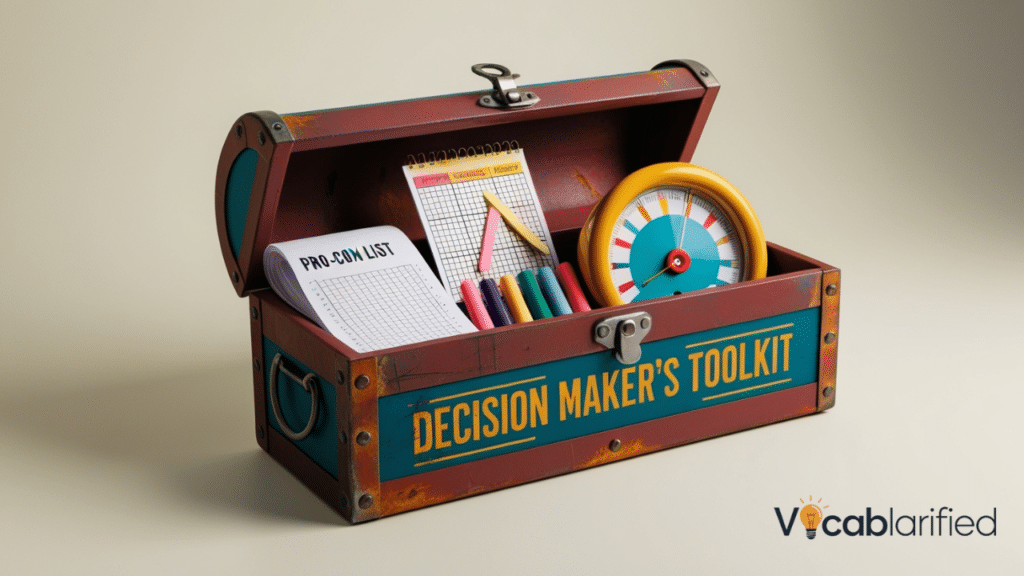
Here are some approaches that can help:
| Strategy | Description | Best Used For |
|---|---|---|
| Pro-Con List | List advantages and disadvantages | Simple decisions |
| Decision Matrix | Evaluate options against criteria | Complex choices |
| Scenario Planning | Imagine potential outcomes | Long-term decisions |
| Gut Check | Trust your intuition | Time-sensitive choices |
| Seek Advice | Consult experts or mentors | Unfamiliar territories |
| Sleep On It | Allow subconscious processing | Important life decisions |
| Limit Options | Reduce choices to prevent overwhelm | Daily decisions |
| Use a Framework | Apply a structured decision model | Business decisions |
| Consider Values | Align choices with personal beliefs | Ethical dilemmas |
| Reverse Engineer | Start with desired outcome | Goal-oriented decisions |
The Future of Choosing
As we look to the future, the act of choosing is likely to evolve further. Artificial intelligence and machine learning are already assisting in decision-making processes across various fields. However, the uniquely human aspects of choice – intuition, emotional intelligence, and ethical considerations – will continue to play a crucial role.

Embracing the Power of Choice
In conclusion, whether you’re choosing a career path, a life partner, or simply what to have for dinner, remember that the power to choose is a fundamental human right and responsibility. By understanding the correct usage of “choosing” in your linguistic practice and developing robust decision-making skills, you empower yourself to navigate life’s complexities with confidence.
The next time you find yourself hesitating between “choosing” and “chosing,” remember this article. Opt for the correct form, “choosing,” and take pride in your mastery of English language nuances. After all, every choice we make, big or small, shapes our path in life. Choose wisely, and choose often.

Emma Carter is an experienced blogger at Vocablarified. She enjoys helping people expand their vocabulary and improve their language skills. With a warm and approachable writing style, Emma makes learning new words fun and accessible. When she’s not writing, she loves reading books and discovering new phrases to share with her readers. Emma is passionate about making language learning an enjoyable journey for everyone.

